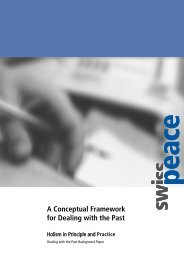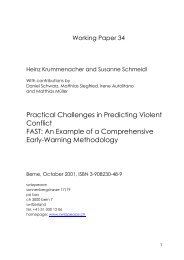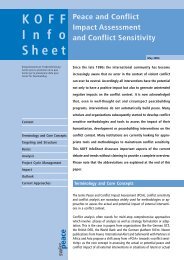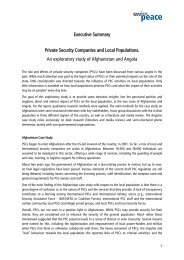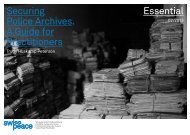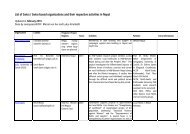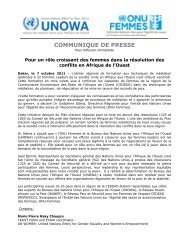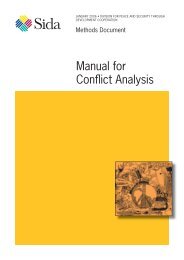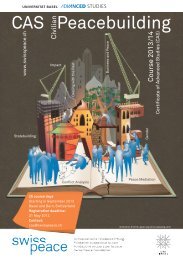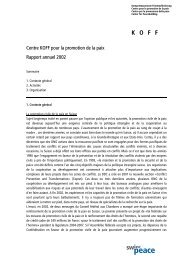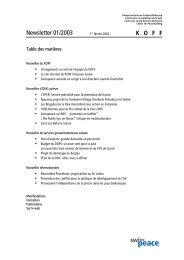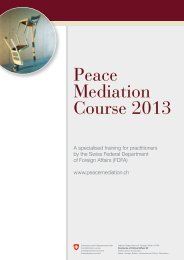Unpacking the Mystery of Mediation in African Peace ... - Swisspeace
Unpacking the Mystery of Mediation in African Peace ... - Swisspeace
Unpacking the Mystery of Mediation in African Peace ... - Swisspeace
You also want an ePaper? Increase the reach of your titles
YUMPU automatically turns print PDFs into web optimized ePapers that Google loves.
<strong>Unpack<strong>in</strong>g</strong> <strong>the</strong> <strong>Mystery</strong> <strong>of</strong> <strong>Mediation</strong> <strong>in</strong> <strong>African</strong> <strong>Peace</strong> Processes<br />
were outside <strong>the</strong> territory at <strong>the</strong> time, many <strong>in</strong><br />
Morocco. 243 Morocco, on <strong>the</strong> o<strong>the</strong>r hand, has <strong>in</strong>sisted<br />
that members <strong>of</strong> all Saharan tribes l<strong>in</strong>ked to<br />
<strong>the</strong> former Spanish Sahara must be eligible to<br />
vote. S<strong>in</strong>ce <strong>the</strong> partial occupation <strong>of</strong> Western Sahara,<br />
Morocco has used all possible means to<br />
support settlement by Moroccans <strong>in</strong> <strong>the</strong> territory<br />
<strong>in</strong> order to <strong>in</strong>crease <strong>the</strong> Moroccan constituency.<br />
Accord<strong>in</strong>g to <strong>the</strong> Spanish census, <strong>in</strong> 1974, 73,500<br />
<strong>of</strong> Western Sahara’s 95,000 <strong>in</strong>habitants were Sahrawis<br />
and <strong>the</strong> rest Europeans. 244 In 2000, <strong>the</strong> UN<br />
Identification Commission identified 250,000<br />
<strong>in</strong>habitants, only 86,425 <strong>of</strong> whom it deemed eligible<br />
to vote. 245 The Baker Plan I proposed that<br />
“to be qualified to vote <strong>in</strong> such a referendum a<br />
voter must have been a full-time resident <strong>of</strong><br />
Western Sahara for at least one year.” 246<br />
On <strong>the</strong> second dispute, concern<strong>in</strong>g <strong>the</strong> ballot<br />
choice, <strong>the</strong> Baker Plan II named <strong>in</strong>dependence,<br />
<strong>in</strong>tegration <strong>in</strong> Morocco, or autonomy as options<br />
<strong>of</strong> <strong>the</strong> referendum which was to be held after 5<br />
years <strong>of</strong> a peace agreement. 247 In <strong>the</strong> meantime,<br />
Morocco would be <strong>in</strong> charge <strong>of</strong>, amongst o<strong>the</strong>r<br />
th<strong>in</strong>gs, “exclusive competence over foreign relations,<br />
[…] national security and external defence<br />
[…] and <strong>the</strong> preservation <strong>of</strong> <strong>the</strong> territorial <strong>in</strong>tegrity<br />
aga<strong>in</strong>st secessionist attempts”. 248 Fur<strong>the</strong>rmore,<br />
<strong>the</strong> plan stated: “All laws passed by <strong>the</strong> Assembly<br />
[…] must respect and comply with <strong>the</strong><br />
constitution <strong>of</strong> <strong>the</strong> K<strong>in</strong>gdom <strong>of</strong> Morocco.” 249 .<br />
Never<strong>the</strong>less, Morocco rejected full <strong>in</strong>dependence<br />
as an option, claim<strong>in</strong>g <strong>the</strong> territory as part <strong>of</strong> <strong>the</strong><br />
k<strong>in</strong>gdom on historical grounds. 250 This position<br />
opposes a statement by <strong>the</strong> International Court <strong>of</strong><br />
Justice made <strong>in</strong> 1975, which did not confirm<br />
243 Ibid., p. 59.<br />
244 United Nations: “<strong>Peace</strong> plan for self-determ<strong>in</strong>ation <strong>of</strong> <strong>the</strong> people<br />
<strong>of</strong> Western Sahara”, <strong>in</strong>: Report <strong>of</strong> <strong>the</strong> Secretary-General<br />
S/2003/565, Annex II (2003), p. 13.<br />
245 MINURSO: “Milestones <strong>in</strong> <strong>the</strong> Western Sahara Conflict”, p. 3,<br />
(http://www.m<strong>in</strong>urso.unlb.org/milestones.pdf).<br />
246 United Nations: “Framework agreement on <strong>the</strong> Status <strong>of</strong> Western<br />
Sahara”, <strong>in</strong>: Report <strong>of</strong> <strong>the</strong> Secretary-General S/2001/613, Annex<br />
I (2001).<br />
247 United Nations: “<strong>Peace</strong> plan for self-determ<strong>in</strong>ation <strong>of</strong> <strong>the</strong> people<br />
<strong>of</strong> Western Sahara”, <strong>in</strong>: Report <strong>of</strong> <strong>the</strong> Secretary-General<br />
S/2003/565, Annex II (2003).<br />
248 Ibid.<br />
249 Ibid.<br />
250 International Crisis Group: “Western Sahara: <strong>the</strong> Cost <strong>of</strong> <strong>the</strong><br />
Conflict“, Middle East/North Africa Report n. 56 (11 June<br />
2007), p. 9, (http://www.crisisgroup.org/<br />
home/<strong>in</strong>dex.cfm?l=1&id=5235).<br />
88<br />
“any tie <strong>of</strong> territorial sovereignty between <strong>the</strong> territory<br />
<strong>of</strong> Western Sahara and <strong>the</strong> K<strong>in</strong>gdom <strong>of</strong><br />
Morocco.” 251 Polisario, on <strong>the</strong> o<strong>the</strong>r hand, has <strong>in</strong>sisted<br />
that <strong>in</strong>dependence be presented to <strong>the</strong> voters<br />
as an option.<br />
The Baker Plan II failed, although K<strong>of</strong>i Annan<br />
had written that he believed that it provided a<br />
“fair and balanced approach towards a political<br />
solution […] provid<strong>in</strong>g each side some, but perhaps<br />
not all, <strong>of</strong> what it wants.” 252<br />
Participation and Inclusiveness<br />
Although Baker had arranged face-to-face meet<strong>in</strong>gs<br />
and consultations on track 1 before, <strong>in</strong> <strong>the</strong><br />
creation <strong>of</strong> <strong>the</strong> Baker Plan I, nei<strong>the</strong>r <strong>the</strong> Frente<br />
Polisario nor <strong>the</strong> Moroccan government were directly<br />
<strong>in</strong>volved <strong>in</strong> <strong>the</strong> elaboration phase. The plan<br />
was formulated by <strong>the</strong> mediator <strong>in</strong>dependently <strong>of</strong><br />
<strong>the</strong> parties, who could not present any amendments<br />
to its contents before it was completed and<br />
submitted to <strong>the</strong>m for <strong>the</strong>ir approval. After its rejection,<br />
Baker drafted <strong>the</strong> Baker Plan II based on<br />
<strong>the</strong> parties’ criticisms <strong>of</strong> <strong>the</strong> first one, but aga<strong>in</strong><br />
without <strong>the</strong> direct <strong>in</strong>volvement <strong>of</strong> ei<strong>the</strong>r Morocco<br />
or <strong>the</strong> Frente Polisario. Although he consulted<br />
<strong>the</strong> leaders <strong>of</strong> all parties beforehand, he did not<br />
br<strong>in</strong>g <strong>the</strong>m to <strong>the</strong> same table to work out a compromise<br />
plan toge<strong>the</strong>r. Instead, he drafted <strong>the</strong><br />
text <strong>in</strong>dependently and <strong>the</strong>n submitted it to <strong>the</strong><br />
parties, hop<strong>in</strong>g <strong>the</strong>y would accept <strong>the</strong> compromise<br />
that he had worked out for <strong>the</strong>m, as he had<br />
done with <strong>the</strong> previous plan. 253<br />
<strong>Mediation</strong> Style and Strategy<br />
One ma<strong>in</strong> feature <strong>of</strong> Baker’s engagement was that<br />
he never pressured <strong>the</strong> parties to accept a certa<strong>in</strong><br />
agreement. No decision taken was ever b<strong>in</strong>d<strong>in</strong>g<br />
on <strong>the</strong> parties if <strong>the</strong>y did not agree with it. 254 The<br />
UN was never <strong>in</strong> a position to enforce any decision<br />
aga<strong>in</strong>st <strong>the</strong> wishes <strong>of</strong> <strong>the</strong> parties. The Baker<br />
Plan II suggested that <strong>the</strong> UN would give a b<strong>in</strong>d<strong>in</strong>g<br />
op<strong>in</strong>ion on <strong>the</strong> electorate <strong>in</strong> <strong>the</strong> referendum<br />
251 International Court <strong>of</strong> Justice (1975): op. cit., p. 117.<br />
252 United Nation: “Report <strong>of</strong> <strong>the</strong> Secretary-General S/2003/565”<br />
(23 May 2003), p. 10.<br />
253 Jensen (2005): op. cit., p. 113.<br />
254 Zartman, William and Touval, Saadia: “International <strong>Mediation</strong><br />
<strong>in</strong> <strong>the</strong> Post-Cold War Era”, <strong>in</strong>: Crocker, Chester and Osler<br />
Hampson with Pamela Tall, ed.: Manag<strong>in</strong>g Global Chaos<br />
(1996), pp. 455 – 461.




